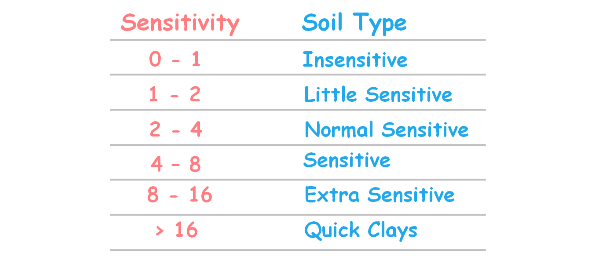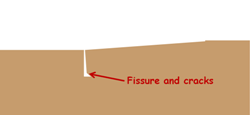 Cohesive soils have a certain particle structure in its natural state of occurrence that was developed during the original process of soil formation.
Cohesive soils have a certain particle structure in its natural state of occurrence that was developed during the original process of soil formation.
Cohesive soils are soils which particles stick to each other, which are bonded together by some force.
Soil structure means the geometrical arrangement of soil particles in a soil mass. Engineering properties and behaviour of both coarse grained and fine grained soils depend upon this soil structure.
When such soil is disturbed by loading or transportation, it is remoulded. And due to the remoulding soil’s engineering properties change considerably.

It is observed that cohesive soils, upon remoulding, lose some of their strength. The loss of the strength of a soil upon remoulding is partly due to change in the soil structure and partly due to disturbance caused to water molecules in the adsorbed layer
A term called Sensitivity of soil is defined to measure of the loss in strength of soils as a result of remoulding.
Sensitivity is denoted as St and it is defined as the ratio of the unconfined compressive strength of a specimen of undisturbed soil to the unconfined compressive strength of a specimen of the same soil after remolding but possessing the same water content.

 The unconfined compressive strength is the maximum axial compressive stress that a cylindrical sample of material can withstand and it should not be confined in any container that is there must not be any lateral stress.
The unconfined compressive strength is the maximum axial compressive stress that a cylindrical sample of material can withstand and it should not be confined in any container that is there must not be any lateral stress.
It is also known as Uni-axial compressive strength of material because the application of compressive stress is only along one axis of the sample. We denote this compressive strength by qu.
If soil’s strength does not change after remoulding then compressive strength of undisturbed soil and remoulded soil being the same sensitivity of the soil will be equal to one and such soils are called insensitive soils.

Then there are soils which lose up to half of their strength upon remoulding, their sensitivity value vary from one to two. These soils are called little sensitive.

Depending upon the sensitivity, soils may be divided into these following categories.

When sensitivity of soil is between 2 and 4 soil is moderately sensitive or normal sensitive.
If sensitivity is between 4 and 8 then soils are the sensitive soils. On remoulding these soils lose more than 75% of their strength.
Sensitivity between 8 and 16 are the extra sensitive soils.
And soils having sensitivity higher than 16 are called Quick Clays. They are unstable and they collapse when overloaded.
High sensitive soils are not desirable for foundation.

Soils generally have a sensitivity value 1 or greater than 1.
But if stiff soils have fissures or cracks it may sometimes exhibit a sensitivity value of less than 1, because these cracks present in an undisturbed soil may be removed upon remoulding. Hence their strength will increase after remoulding.






